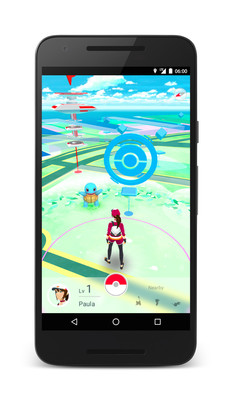Interest
Japanese Transportation Authorities, Landmarks Issue Warnings to Pokémon Go Players
posted on by Amanda Whalen

Since the first release of smartphone game Pokémon Go on July 6, aspiring trainers have been venturing out into the unknown in search of new and rare Pokémon. Some businesses have enjoyed an unexpected surge in customers, while some memorials and landmarks have found their inclusion inappropriate and have banned the game from their premises. Trainers have also begun to discover on their own that some places are unwise locations to play, while others can be downright dangerous.
Now, after the game's launch in Japan on July 22, Japanese fans have been able to experience the craze for themselves, and authorities, transportation companies, and landmarks in Japan are already scrambling to ban the game in a variety of locations, citing safety concerns and respect for cultural and historical sites.
 In the interest of safety, six major highway companies in Japan have banded together to submit a written request to Niantic, The Pokémon Company, and Nintendo, for Pokémon to no longer appear along highways. This comes in response to an incident on the evening of July 24 when a pedestrian became lost while playing Pokémon Go and wandered onto a nearby highway. The pedestrian wasn't injured, but was sternly reprimanded by the police before being returned to his family.
In the interest of safety, six major highway companies in Japan have banded together to submit a written request to Niantic, The Pokémon Company, and Nintendo, for Pokémon to no longer appear along highways. This comes in response to an incident on the evening of July 24 when a pedestrian became lost while playing Pokémon Go and wandered onto a nearby highway. The pedestrian wasn't injured, but was sternly reprimanded by the police before being returned to his family.
The Eastern Japan Highway company has also posted an official message to Pokémon trainers on their website, emphasizing that it is forbidden for anyone traveling by foot or bicycle to enter a highway, and that cell phones should not be used at all while operating a vehicle. Furthermore, they ask that people refrain from stopping their vehicles on the shoulder for the purpose of catching Pokémon. The warning is understandable: there have already been several Pokémon Go-related traffic accidents in Japan since the game's launch.
Likewise, the Japan Rail and 23 private railway companies have submitted a similar petition to Niantic.
Authorities are also concerned that players may attempt to enter the contaminated exclusion zone surrounding the damaged Fukushima nuclear reactor in pursuit of Pokémon. The Tokyo Electric Power Company, or Tepco, apparently tested the Fukushima Daiichi plant, the primary nuclear facility affected during the March 2011 disaster, as well as two other nearby power plants, the Fukushima Daini plant and the Kashiwazaki-Kariwa plant in Niigata Prefecture, and found that Pokémon were appearing there. They have since asked that Niantic exclude Pokémon from the exclusion zone in order to prevent players from stumbling into the potentially dangerous area affected by the nuclear reactor meltdown.
In order to preserve respect for historical and spiritual sites, the Izumo Shrine, which is considered one of the oldest and most important Shinto shrines in Japan, has put up notices banning visitors from playing Pokémon Go on its grounds.

Several other cultural landmarks have done the same. The volcano at Mount Osore has banned the game not only out of respect for the sacred site, but also out of concern for any accidents that could occur on the rough terrain. Kumamoto Castle, which was damaged in the April 2016 Kumamoto earthquake, has many areas that are off limits due to repairs and has requested that it be removed from the game in order to prevent trespassing, which could end up being dangerous for any overzealous Pokémon trainers.

Other places that have banned Pokémon Go include the Hōryū temple in Nara, the Miyazaki Shinto shrine, the Unshoji temple in Fujisawa, the Hiroshima Peace Site, and the Nagasaki Peace Park. Officials of the Nagasaki Peace Park, which serves as a memorial for the 1945 atomic bombing, said, “The Nagasaki Peace Park is a place to pray. Playing games is not an appropriate activity."

However, the Kaigen-ji Temple in Kyoto's Fukuchiyama district has taken a stand, saying that it is happy to welcome Pokémon Go players to its grounds—and its Pokémon gym. It has even set out phone chargers for trainers to borrow, shown below.
ポケモントレーナー用の充電設備を観音堂の前に置きました。私のiPhoneSEは10分で10%ほど充電。うちはジムで隣のお寺もポケストップ。うちの境内から両方エリアに入るのでポケモン… https://t.co/hPYybYalhO pic.twitter.com/r8KCzuhORk
— 芝原 三裕 (@shiba3) July 24, 2016
ポケモントレーナーに優しい海眼寺に行ってきました。
— おむつケーキ (@omutucake) July 24, 2016
ジムにめちゃくちゃ強いポケモンが居てすごすごと帰りました(´Д' ) pic.twitter.com/GUJDhlGPWA
Source: IT Media via Yaraon, NHK News, Inside Games, Izumo Oyashiro via Otakumu, RocketNews (link 2), Gizmodo, RT, The Guardian
Images: Yonago City Tourism Association, Japan Times, Flickr/Chris Gladis